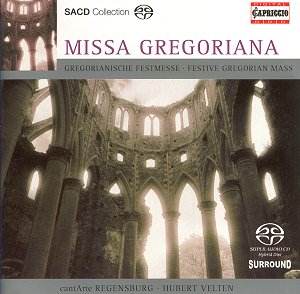
Buy
through MusicWeb for
£10.35 postage paid.
You may prefer to pay by Sterling cheque or
Euro notes to avoid PayPal. Contact![]() for
details
for
details
Missa Gregoriana
Gregorian Chant
Creator Alme Siderum (Introitus) [2:31]
Gaudete [4:26]
Kyrie Im 5. Ton (Kyrie) [2:06]
Gloria Im 5. Ton (Gloria [3:13]
Graduale: Viderunt Omnes (Epistula) [0:44]
Halleluja: Vidimus Stella (Evangelium) [2:20]
Marianische Antiphon Der Quadragese: Ave
Regina Caelorum [1:41]
Improperia: Popule Meus [9:00]
Sequenz: Victimae Paschalis Laudes [2:04]
Hymnus: Ad Christum Regem [4:13]
Terra Tremuit (Offertorium) [1:27]
Sanctus Im 5. Ton (Sanctus) [1:50]
Agnus Dei Im 5. Ton (Agnus Dei) [1:32]
Pascha Nostrum (Communio) [1:34]
Hymnus: A Solis Ortus Cardine (Ite Missa
Est) [5:04]
Hymnus Eclesiae
Hochfest Christi Himmelfahrt (Viri Galilaei)
[3:05]
Hochfest Der Pentecoste, Hymnus (Veni Creator
Im 8. Ton) [3:40]
Hochfest Des Pentecoste, Introitus (Spiritus
Domini) [3:12]
Fest Der Aufnahme Maria In Den Himmel (Signum
Magnum) [3:02]
Fest Maria Geburt (Solemnitas) [2:46]
Marianische Antiphon (Salve Regina) [1:58]
Magnificat [4:06]
![]() cantArte Regensburg/Hubert Velten
cantArte Regensburg/Hubert Velten
Compilation dated 2005 from earlier recordings
probably by Bayerischen Rundfunk (no date) DDD 5.0 Surround
![]() CAPRICCIO SACD 71051
CAPRICCIO SACD 71051 ![]() [65:36]
[65:36]










